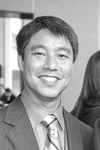
David Inoue
In JACL’s formal statement for this year’s Day of Remembrance, we made the broad assertion, “We remember that Japanese Americans were forced to prove their allegiance to our Constitution through the dedication of military service for a country that was imprisoning their families with no guarantee of release.”
I would like to offer my sincerest apologies that this statement implied that our Nisei veterans, or any veteran, might have served because they had been forced to do so. As we all know, many of our Nisei veterans had to fight for the right to serve, against the government and a military that did not want them, but ultimately embraced them in the end. JACL played a significant role in that fight.
It is the point of the government’s distrust of Japanese Americans that I want to spend some time discussing in this column. The incarceration was built upon the lie that Japanese Americans were disloyal, that we represented a fifth column that would undermine the war effort in support of Japan.
Ironically, we learned years after World War II that the government knew very well that there was no security threat posed by Japanese Americans even before the incarceration. Incarceration was founded entirely upon racist animus toward Japanese and Japanese Americans.
Unfortunately, we continue to see this same type of prejudice persist today. The Muslim ban was upheld by the Supreme Court on the same basis of past Supreme Court cases that were upheld on the premise that the government should be given great latitude in responding to a perceived security threat, regardless of the racist underpinnings so clear in the preparation of the policy.
The other day, I was in conversation with someone who disagreed with JACL’s support of the Muslim community. The assertion was that Muslims were fundamentally different from us because they prioritized their religion over anything else and would bring Sharia law to the United States if given the chance. Muslims could not be trusted.
Being Christian myself, and knowing him to also be, I asked if he placed his faith to God above his allegiance to our country. Suddenly, he had the look of recognition of the double standard he had been employing. There was the recognition of commonality in faith, but also that religious faith can be pursued by anyone, without tainting his or her patriotism or ability to be a loyal American. Just as we had to prove that one’s ancestry does not impact one’s loyalty to country.
This discussion also happened against the backdrop of multiple charges of anti- Semitism against freshman U.S. Rep. Ilhan Omar of Minnesota. Among the comments under scrutiny was one in particular, “So for me, I want to talk about the political influence in this country that says it is OK for people to push for allegiance to a foreign country.” The insinuation is quite clear — there is a dual loyalty for some to a foreign country, in this case, Jews to Israel, and also pushing that allegiance onto others.
Questions 27 and 28 were wrong 75 years ago. To ask similar questions of other Americans today simply because of their race, religion or even political party affiliation would be equally wrong. One of the easiest ways to delegitimize someone else’s views is to brand him or her as not being American. In this hyperpolarized political environment today, charges of disloyalty come cheap, but not without cost.
A single tweet may seem innocuous, but start adding them up, and trust begins to erode. Perceptions are hardened. Incarceration of Japanese Americans did not happen overnight but with the accumulation of multiple racist policies over several years. We must make sure that we stand up early enough to stop the escalation to something worse.
With the New Zealand shooting following a series of religiously focused mass shootings here in the United States, we are seeing the ugly culmination of unchecked discrimination, bigotry and racism. We can start to bring a stop to this by not carelessly questioning one another’s loyalty.
David Inoue is executive director of the JACL and is based in the organization’s Washington, D.C., office.



